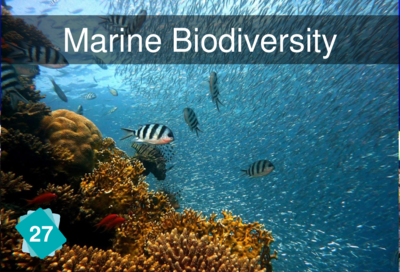En-en adult card 27 marine biodiversity: Difference between revisions
Jump to navigation
Jump to search
No edit summary |
(→Causes) |
||
| (8 intermediate revisions by 3 users not shown) | |||
| Line 1: | Line 1: | ||
== Card #27: Marine Biodiversity == | |||
<center> | |||
== Explanation == | [[File:En-en_adult_card_27_front.png|400px]] | ||
Pteropods and coccolithophores are at the base of the ocean food chain. If they are driven to extinction, all marine biodiversity will be threatened. | |||
Warming ocean waters also threaten marine biodiversity. | |||
</center> | |||
== Explanation== | |||
For the moment, marine biodiversity is more endangered by overfishing than by climate change or acidification. But in the long term, these two phenomena will considerably increase their pressure. The FAO estimates that between 660 and 820 million people worldwide, about 10% of the world's population, are directly or indirectly dependent on fisheries and aquaculture. | |||
== Correction== | |||
===Causes=== | |||
* [[En-en_adult_card_17_Rising_Water_Temperatures|Rising Water Temperatures]] | |||
* [[En-en_adult_card_29_pteropods_and_coccolithophores|Pteropods and Coccolithophores]] | |||
=== Consequences === | |||
*[[En-en_adult_card_37_hunger|Hunger]] | |||
== Other possible links == | == Other possible links == | ||
=== Other causes === | |||
* [[En-en adult card 1 human activities|Human activities]] With this link, we can signify all the degradations that humankind is inflicting on marine life, such as plastic pollution and overfishing. This is irrelevant to the subject of climate change, but it is interesting to make the link anyway. If we are talking to an older audience, we can for example mention the size of sardine tins which has decreased because they don't have time to grow before they are fished. | |||
* [[En-en adult card 25 terrestrial biodiversity|Terrestrial biodiversity]] The two types of biodiversity can interact with each other. | |||
=== | === Other consequences === | ||
* [[En-en adult card 25 terrestrial biodiversity|Terrestrial biodiversity]] The two types of biodiversity can interact with each other. | |||
[[En-en adult card 25 terrestrial biodiversity|Terrestrial biodiversity]] The two types of biodiversity can interact with each other. | |||
== To go further == | == To go further == | ||
=== Direct impact of human activities === | === Direct impact of human activities === | ||
Overfishing is the main cause of fish | Overfishing is the main cause of the disappearance of fish. Here are some numbers: | ||
* Every year, between | * Every year, between 1,000 and 2,700 billion fish are caught<ref>[http://fishcount.org.uk/studydatascreens/2016/fishcount_estimates_list.php ''Fishcount estimates of numbers of individuals killed in (FAO) reported fishery production'', FishCount]</ref>. If humans were killed at the same rate, it would take only 37 hours to exterminate the human population. | ||
* Plastic pollution kills 1.5 million marine animals<ref>[https://conserveturtles.org/information-sea-turtles-threats-marine-debris/ ''Information About Sea Turtles: Threats from Marine Debris'', Sea turtle Conservacy]</ref>, or 0.0001% of all fishing-related deaths. | * Plastic pollution kills 1.5 million marine animals<ref>[https://conserveturtles.org/information-sea-turtles-threats-marine-debris/ ''Information About Sea Turtles: Threats from Marine Debris'', Sea turtle Conservacy]</ref>, or 0.0001% of all fishing-related deaths. | ||
Latest revision as of 10:30, 31 October 2021
Card #27: Marine Biodiversity
Pteropods and coccolithophores are at the base of the ocean food chain. If they are driven to extinction, all marine biodiversity will be threatened. Warming ocean waters also threaten marine biodiversity.
Explanation
For the moment, marine biodiversity is more endangered by overfishing than by climate change or acidification. But in the long term, these two phenomena will considerably increase their pressure. The FAO estimates that between 660 and 820 million people worldwide, about 10% of the world's population, are directly or indirectly dependent on fisheries and aquaculture.
Correction
Causes
Consequences
Other possible links
Other causes
- Human activities With this link, we can signify all the degradations that humankind is inflicting on marine life, such as plastic pollution and overfishing. This is irrelevant to the subject of climate change, but it is interesting to make the link anyway. If we are talking to an older audience, we can for example mention the size of sardine tins which has decreased because they don't have time to grow before they are fished.
- Terrestrial biodiversity The two types of biodiversity can interact with each other.
Other consequences
- Terrestrial biodiversity The two types of biodiversity can interact with each other.
To go further
Direct impact of human activities
Overfishing is the main cause of the disappearance of fish. Here are some numbers:
- Every year, between 1,000 and 2,700 billion fish are caught[1]. If humans were killed at the same rate, it would take only 37 hours to exterminate the human population.
- Plastic pollution kills 1.5 million marine animals[2], or 0.0001% of all fishing-related deaths.
